What is contained in onions: what vitamins and microelements
Onions are one of the most popular vegetable crops. He is famous among many nations. Each of us knows well that onions can be consumed raw, stewed, fried, or canned. But we rarely think about what is beneficial in onions, what their vitamin composition is. We will talk about this in the article.
What vitamins are included in onions?
The rich content of vitamins and minerals in onions, along with excellent taste, makes it widely popular in cooking.
Important! Not only the fragrant bulbs, but also the husks and green mass (“feathers”) contain a considerable amount of vitamins and microelements.
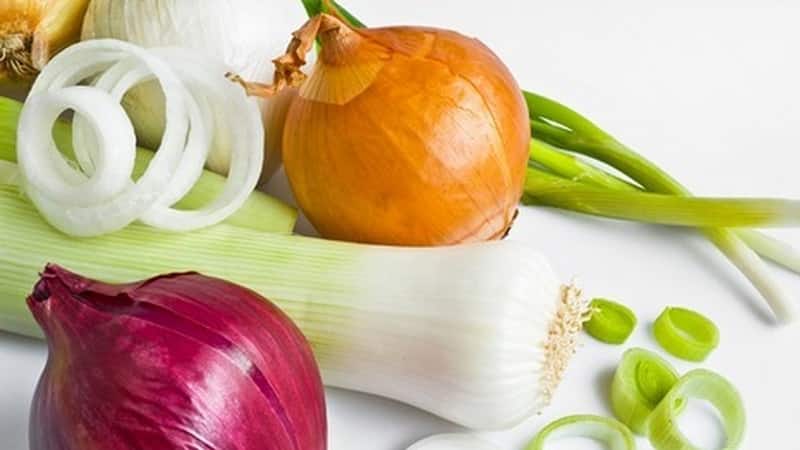
Onions contain:
- Vitamin C, or ascorbic acid. A well-known antioxidant that helps produce collagen in the body. Its role is significant: it is responsible for the process of rejuvenation and cell regeneration, renewal and formation of the skin, bone tissue, blood vessels, etc. Vitamin C has a beneficial effect on the immune system and takes part in the redox processes of the body.
- Vitamin A, to which the human immune system owes its existence. Beta carotene is also an antioxidant. It actively affects visual function and a number of functions of the nervous system. Takes part in the process of hormone production and bone formation. The quality and quantity of breast milk in women directly depends on vitamin A.
- Vitamin B1, or thiamine. His “responsibilities” include ensuring the proper progress of metabolism. Do not believe that nerve cells do not recover. This vitamin is responsible not only for the formation, but also for the systematic renewal of cells of the nervous system. Without thiamine, it is impossible to imagine the normal transfer of genetic information between cells during reproduction.
- Riboflavin, or vitamin B2, is actively involved in the process of hematopoiesis. Without his participation, normal functioning of the adrenal glands is impossible. It also protects the visual organs from exposure to ultraviolet rays. Vitamin B2 takes part in the synthesis of nerve cells of the central and peripheral nervous systems.
- Vitamin B9 (another name is folic acid) is useful for women during pregnancy. It plays an important role in the formation of DNA and the nervous system of the fetus. Moreover, folic acid enhances female fertility.
- Vitamin E (tocopherol) promotes the renewal of all body systems and protects it from the influence of harmful factors due to its antioxidant properties. Participates in the process of digestion of proteins and fats. Tocopherol affects the strengthening of human immunity, and in the process of hematopoiesis it helps normalize coagulation and accelerate healing. Vitamin E also affects the functioning of the reproductive system, and its use helps prevent infertility.
- Vitamin PP (niacin, nicotinic acid) is responsible for the level of sugar and cholesterol in the body and energy production.
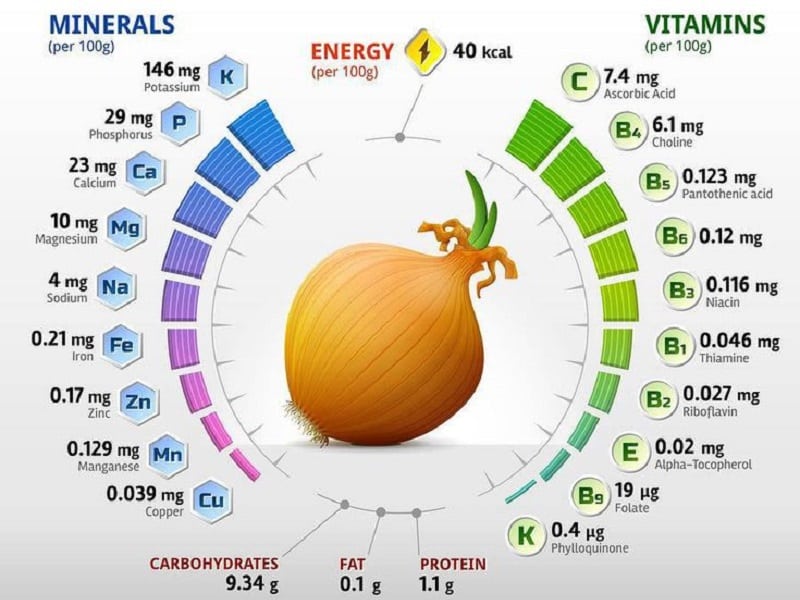
What minerals are contained in onions?
Bulb Onions contain a large amount of a special substance - a flavonoid called quercetin., which breaks down fats and slows down the growth of cancer cells.The bulbs contain phytoncides, which are famous for their bactericidal effect, and sugars, organic acids, and minerals.
Pungency and specific odor this vegetable owes to essential oil.
Reference. The water content of the vegetable is approximately 89%. It contains a lot of carbohydrates, mono- and disaccharides, but less protein, fiber, pectin, organic acids and starch.
Which There are beneficial substances in onions (descending concentration):
- zinc;
- iron;
- manganese;
- potassium;
- copper;
- phosphorus;
- calcium;
- fluorine;
- sodium;
- magnesium;
- cobalt;
- iodine.
Useful substances for the human body
Onions are in the honorable row of products that enrich our diet with minerals and vitamins, and are actively used for medicinal purposes.
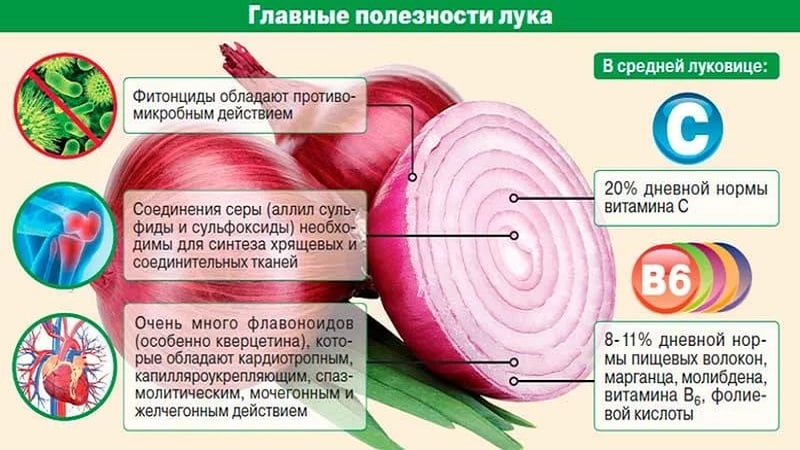
What are the benefits of onions
The bulb, in addition to vitamins, contains a huge amount of active substances and natural antibiotics. Onions have anti-inflammatory and antimicrobial properties. In its composition you can find alkaloids and saponins, inulin and carotene, natural sugars and mineral salts, a considerable amount of fiber and dietary fiber.
Freshly squeezed onion juice Helps fight infections and viruses, increases the body's resistance, destroys pathogens, strengthens the immune system.
His used in cases of intestinal infection, dysbacteriosis, helminthic infestations, weak motor and secretory activity of the stomach, hypertension and atherosclerosis. The high levels of iron and potassium in the bulbs help prevent the development of anemia and heart disease.
Onions have a warming effect, speeds up metabolism and helps in weight loss.
Interesting. The smell of onions, which some people find unpleasant, has a calming effect, eliminates anxiety and promotes sleep.
Fresh onions are used to resolve scars and bruises. Onion masks stimulate hair growth, which is explained by the local irritant effect of onion juice. Onion extract is an ingredient in many proprietary products for the fight against alopecia.
Baked onions are used as an external remedy.. It is applied to small wounds, abscesses and boils. It is able to draw pus from wounds, soften calluses and eliminate spurs.
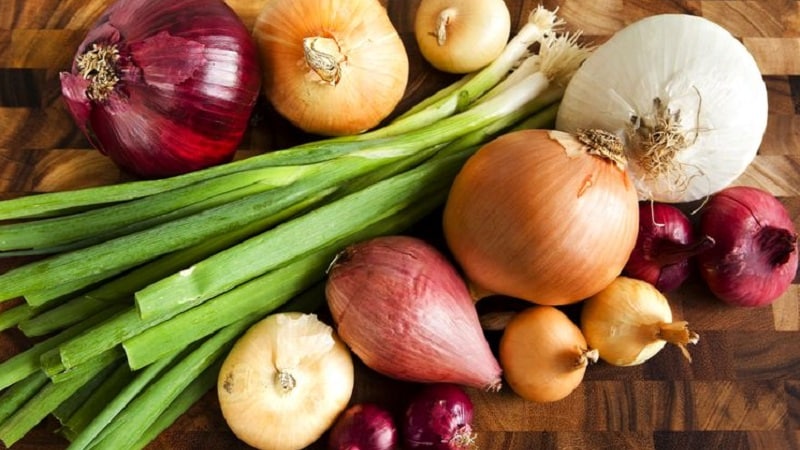
Norms and rules of use
Anyone who strives to lead a healthy lifestyle and adhere to proper nutrition includes as many fruits and vegetables in their diet as possible. But some foods can be both beneficial and harmful if abused. The list of such “controversial” products also includes onions.
Overeating this vegetable can negatively affect your health..
What are the daily consumption restrictions?
Onions are useful only in moderate doses. The daily intake of fresh vegetables for an absolutely healthy person is approximately 100 g. Boiled onions have a smaller amount of useful substances, which is due to the heat treatment process. But even in this form you don’t need to use it too much.
The optimal portion for an adult is no more than 200 g. It is also recommended to eat fried onions only in limited quantities - 100 g per day. Don't forget that it is high in calories. Here are the beneficial properties pickled vegetable appear if there are no more than two onions per day.
How much onion do you need to eat for it to be beneficial?
To get the maximum benefits of onions, it is worth remembering that 150 g of this vegetable (approximately one large onion) contains half the daily requirement of vitamins for the human body and a fifth of the required amount of microelements that are contained in onions.
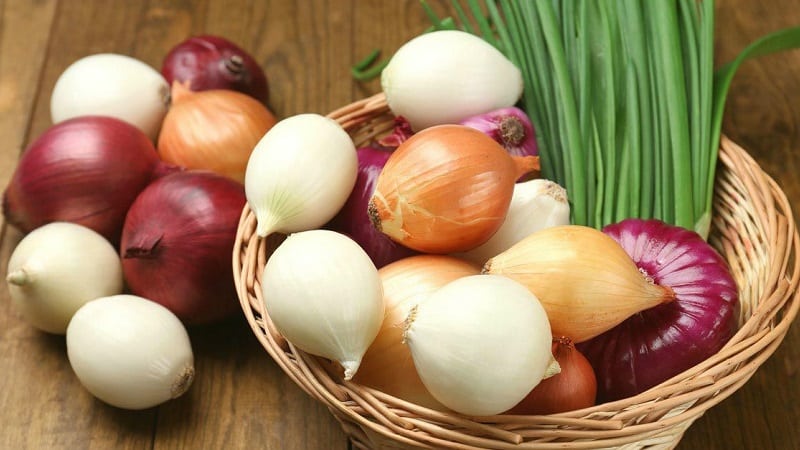
Possible harm and contraindications for use
Basic the harmful effects of onions boil down to:
- irritation of the mucous membranes of organs with all the ensuing consequences (for example, exacerbation of ulcers, gastritis, asthma);
- some inhibition of brain processes (for example, drowsiness);
- negative impact on beneficial intestinal microflora.
The consumption of onions is strictly prohibited for pancreatitis in the acute stage, since it contains essential oils that irritate the mucous membranes, a large amount of acids and dietary fiber - they can cause bloating, colic, and diarrhea in the patient.
Conclusion
Onions can be called a universal product. Thanks to its vitamins and microelements, onions are widely used in cooking, medicine, cosmetology and dietetics. Onions have repeatedly proven their benefits to human health and have therefore become an integral part of our diet.